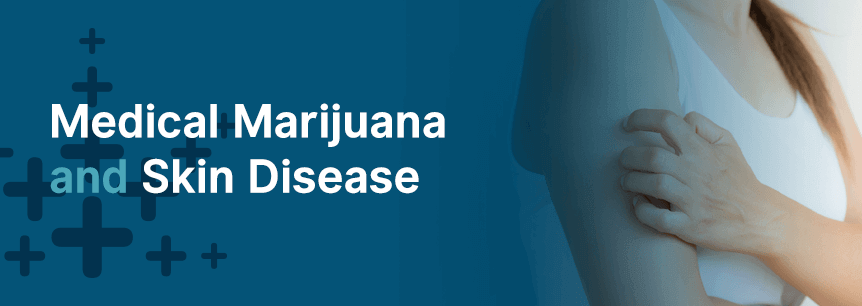
If you have a chronic, inflammatory skin disease, you may benefit from medical marijuana. Recent studies indicate substances in cannabis could help reduce the inflammation common in several skin conditions. Psoriasis and eczema could improve thanks to the numerous medicinal marijuana options now available to add to traditional treatments. As with any medical condition, talk to your doctor, but if standard treatments are not helping control your skin condition enough, find a marijuana-friendly doctor who can help you determine if cannabis is right for you.
Skin diseases affect millions of Americans. Two of the most common chronic skin diseases are eczema and psoriasis. Both problems irritate the skin and can last for years. Treatment typically focuses on reducing itching and pain. You may experience other symptoms depending on the specific skin condition you have.
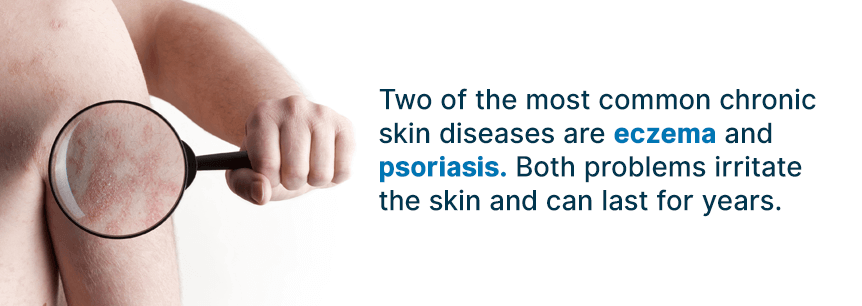
Eczema produces a red, itchy rash on the skin. The most common type is the chronic atopic dermatitis. Around 28 million Americans have atopic dermatitis, but there are four other types of eczema:
Psoriasis happens when too many skin cells grow, creating itchy, painful patches. It’s an autoimmune disease, which occurs when the immune system fights against the body. In the United States, approximately 7.5 million people have psoriasis. Like eczema, there are multiple types of psoriasis you may be diagnosed with, and over time, your diagnosis could change. Here are the most common:
As an autoimmune disease, psoriasis happens when the immune system misidentifies your body as an invader. The result is a life-long battle between your immune system and your skin. Sometimes, people will develop psoriasis after an infection, as often occurs in those with guttate psoriasis. The disease likely triggers the immune system to go into overdrive, leading to the irritation and pain of psoriasis.
Eczema, like psoriasis, occurs from the immune system improperly responding. But unlike psoriasis where the immune system continues to attack the skin throughout your life, atopic dermatitis causes flares after you contact certain triggers. These irritants, though, can be as benign as sweat or clothing. Many times, you won’t be able to avoid all irritants in your life, which is why treatment focuses on easing the itch.
Psoriasis is marked by scaly, red, itchy patches all over your body. Depending on the type of psoriasis you have, these patches could be on your elbows and knees, your scalp or in other places. In addition to skin symptoms, those with psoriasis often experience mental distress in the form of depression, anxiety, reduced self-esteem, and stress.
Eczema also produces red, itchy patches on the skin that feel rough or flaky. These irritated patches can come and go, depending on your lifestyle and stress levels. To make this condition even more difficult to distinguish from psoriasis, some people also have scaly patches of skin.
Because eczema and psoriasis both can last for years and have similar symptoms, you will need to see a dermatologist for an accurate diagnosis. Your treatment and prognosis will depend on the exact condition you have.
Though topical, psoriasis and eczema can have long-lasting effects on your body. For instance, 30 percent of those with plaque psoriasis will progress to the more severe form of psoriatic arthritis.
The itchiness inherent in both psoriasis and eczema can lead to infections, especially if you break the skin while scratching. With plaque psoriasis, you may make the condition worse and increase the size of the inflamed areas by scraping them.
Widespread skin inflammation or discoloration may affect self-esteem. Some people with psoriasis experience depression from their condition and this is a risk for those with eczema, too.
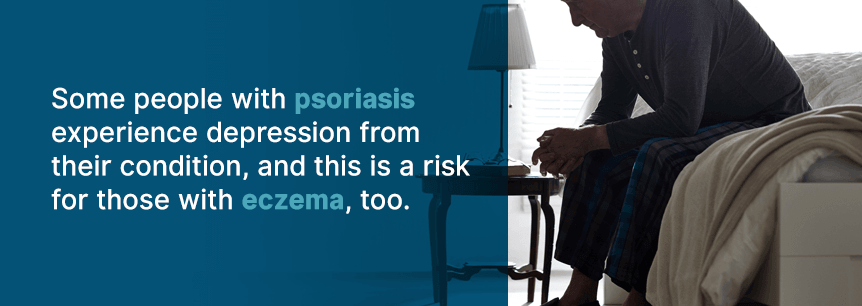
Luckily, with treatment, these life-long conditions can improve, though they cannot be completely cured with currently available medications.
Treating both eczema and psoriasis often involve similar products. Keeping the skin moist reduces the itchiness caused by dry skin. Moisturizers applied to the skin help with this. In addition to moisturizing the skin, another way to slow itchiness is with cortisone cream. Doctors often prescribe cortisone creams for both psoriasis and eczema. This steroid cream reduces inflammation and itchiness on the skin, but it has severe problems with long-term use. Topical retinoids may also cut down on inflammation in those with psoriasis.
Eczema patients who have severe itching may benefit from antihistamine cream or pills instead of, or in addition to, cortisone cream. Antihistamine cream and pills contain the same active ingredient and should not be combined to avoid overdosing.
Depending on the severity of your condition, you may need immunosuppressants. These medications for eczema slow down your immune system, so it won’t overreact to irritants, keeping flares at bay. Because these powerful drugs reduce your body’s reaction to invading germs, they have serious side effects.
Side effects of current treatments for skin problems are many. Though most treatments are topical, they are still drugs that can produce severe reactions in your body. If you experience any of these, talk to your doctor about them, especially if they are troubling or not improving over time. Don’t interrupt your treatment regimen without getting approval from your doctor. Stopping any medication abruptly, whether it’s medical marijuana or cortisone cream, can have adverse effects.
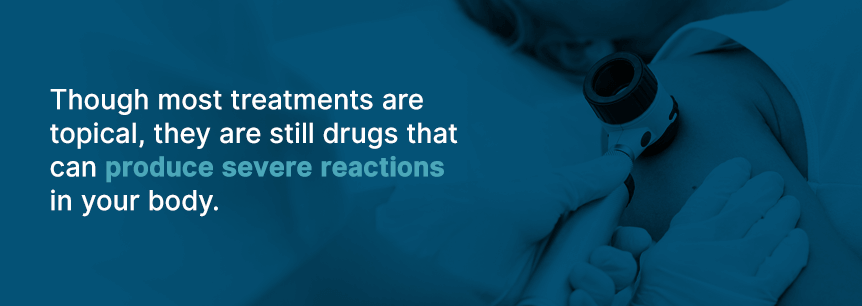
Even over-the-counter cortisone creams can be addictive. Topical steroid withdrawal (TSW) and topical steroid addiction (TSA) can occur if you overuse or misuse cortisone cream. Just days after stopping the cream’s use, patients experienced burning, redness and stinging. The problem comes from patients who are unaware of their medication causing these symptoms, and they self-treat with more cortisone cream. Talk to your doctor if you have to use the maximum amount daily.
Antihistamines are often associated with fighting seasonal allergies, but they also can reduce your body’s eczema reaction. Many people feel drowsy when taking antihistamines, so you should not operate heavy machinery or drive until you know how your body reacts to the medication. If you also use antihistamine cream with oral antihistamines, you could overdose on the active ingredient. Talk to your doctor about all the medicines you’re using, whether topical and oral.
Immunosuppressants put you at a higher risk of becoming sick. Your body’s ability to fight off infections is lowered, and you could become sick more easily if you are around others who are contagious. Additionally, if you do catch something, you could get sicker than you usually would. Talk to your doctor about how you can keep yourself from getting sick while taking immunosuppressants.
Several studies have shown how cannabis or cannabinoids can benefit skin diseases in different ways. Everything from psoriasis to eczema has links to improvement with cannabis creams. Some patients may even see a slowing of melanoma growths thanks to marijuana. Here are some of the conditions helped by weed.
One of the problems unique to psoriasis is the overgrowth of skin cells. In 2007, a study showed that several cannabinoid components of marijuana including THC, CBD, CBN and CBG inhibited excessive skin cell growth. Both cannabidiol (CBD) and tetrahydrocannabinol (THC) have proved useful for easing inflammation. Cannabinol (CBN) can decrease seizures, and cannabigerol (CBG) can fight microbes.
In a human test of endocannabinoid cream, the cream improved sleep and itching by an average of 60 percent. Additionally, the same study showed just over one-third of participants could stop their topical steroids, and 38 percent no longer needed oral antihistamine medicine. One-fifth of those in the study were able to stop using their topical immunomodulators. While this was a single trial of patients with atopic dermatitis-type eczema, it shows how promising marijuana can be for those with skin problems.
Infection with Staphylococcus aureus tends to be both a complication of eczema and part of the problem. The antimicrobial properties of marijuana’s components could make cannabis a means of treating topical staph infections in the future, though currently, this theory needs more empirical evidence and human trials.
Though science is far from creating a cure for melanoma from marijuana, a study published in 2013 linked anandamide, which acts similarly to plant-based cannabinoids, to stopping the proliferation of melanoma cells. Anandamide worked as a toxic substance to the skin cancer cells, killing them. The study only examined cells and not human trials. The researchers were not sure of how anandamide killed the cells, but they acknowledged that it was a complicated process, involving many substances. Years of study will need to show the effects cannabinoids have on cancer cells, but this study does show potential promise.
The benefits of cannabis for those with skin conditions include the anti-inflammatory and anti-itch properties. Research has linked most cannabis compounds to help with inflammation. If you have other symptoms aside from itching and inflammation, talk to your doctor about how you should best use medical marijuana to help your skin condition.
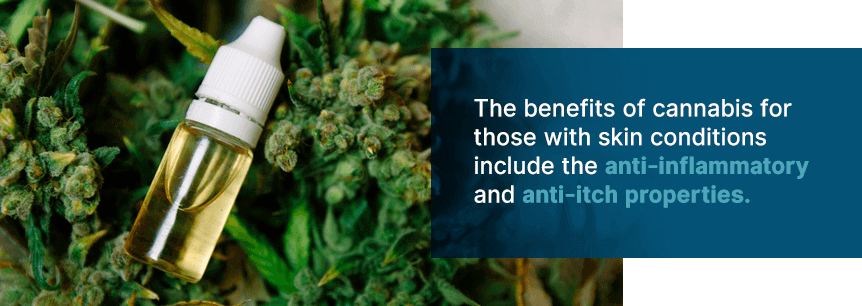
While some people in an eczema study were able to give up their traditional medicines when using endocannabinoid cream, don’t stop using your regular medication unless you discuss it with your physician. Some drugs, even topical ones, can have severe side effects if stopped suddenly. Always talk to your doctor about what medicines you’re currently taking when you decide whether to integrate cannabis into your treatment plan.
For skin problems, topical application is best because it puts the active ingredients directly onto the affected skin. You will find both salves and creams that may contain either CBD, THC or both. Both THC and CBD cut down on pain and inflammation, common in most skin diseases.
Always verify the cream or salve you use for your psoriasis or eczema is approved for use with skin conditions. You may see other creams for arthritis pain at the dispensary, but these could have added ingredients that will irritate your skin. If you’re not satisfied, ask your cannabis-certified doctor about the best marijuana products to treat your skin condition.
Marijuana can produce reactions in different people, depending on how you use it. Because most skin conditions require topical use, you will likely have few side effects. Unlike cannabis products you ingest, topical products do not have mental effects.
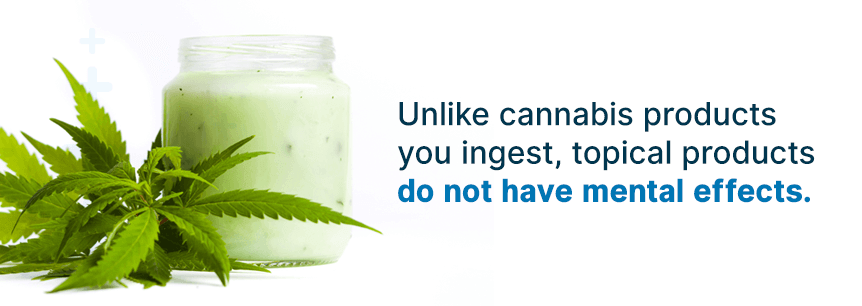
For those with extra sensitive skin, as may occur with eczema or psoriasis, look out for unnecessary terpenes, which may be used in some arthritis creams. Only use weed cream or salve designated for use for skin inflammation. Stay away from products designed for topical pain relief because added ingredients in these creams can irritate your skin, not help heal it.
If you notice irritation using topical cannabis products, talk to your doctor before discontinuing use. This advice is true for all medications. Any side effects are a reason to call your physician but not necessarily reason to stop taking the medicine. Your doctor may recommend a different brand or variety. Doctors create treatment regimens because they believe the good effects will outweigh any possible reactions. Additionally, not every patient experiences adverse effects from using topical cannabis. Don’t let the possibility keep you from using the cream or salve for your skin condition.
If you don’t already have a marijuana doctor, you can find one here at MarijuanaDoctors.com. We want to help you get all the tools you need to take care of your health. Our directory of physicians makes it easy for you to find a medical professional to discuss whether cannabis is a viable treatment option for your skin problem. The doctors on this list are certified to recommend medical marijuana in your state. They will understand how weed acts in your body and help you decide if it’s an appropriate choice to use with your current treatments.
Maybe you already have a doctor’s recommendation for a marijuana product for your skin disease. You need to have a dispensary near you that you can trust. That’s why we also have a listing of dispensaries in states across the U.S. that have legalized marijuana. With these resources, you can round out your medical treatment. If your doctor has suggested cannabis as a way to treat your skin condition, it’s wise to follow the recommendation and see how well medical marijuana can work for you.
Find A Doctor Find A Dispensary